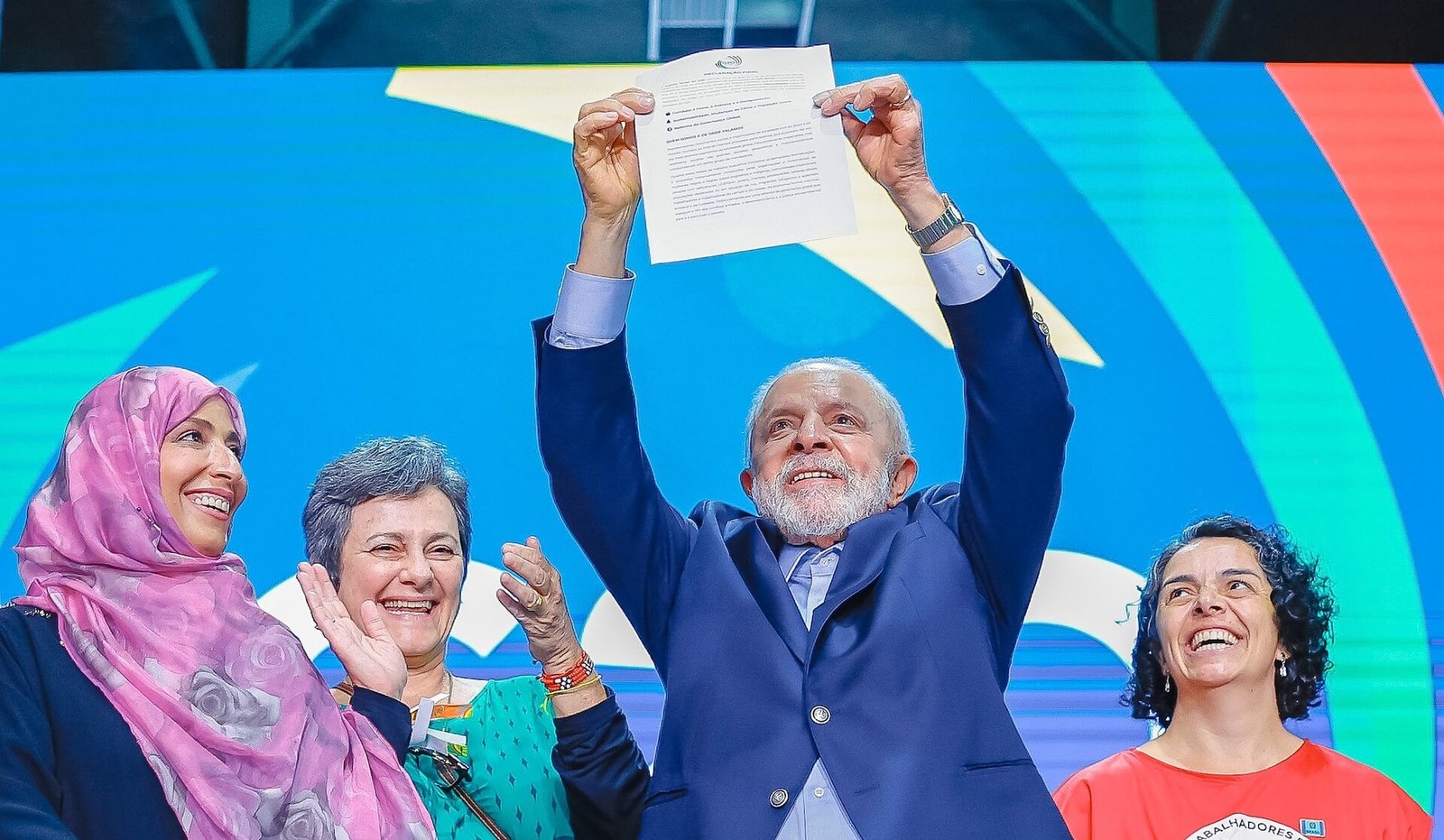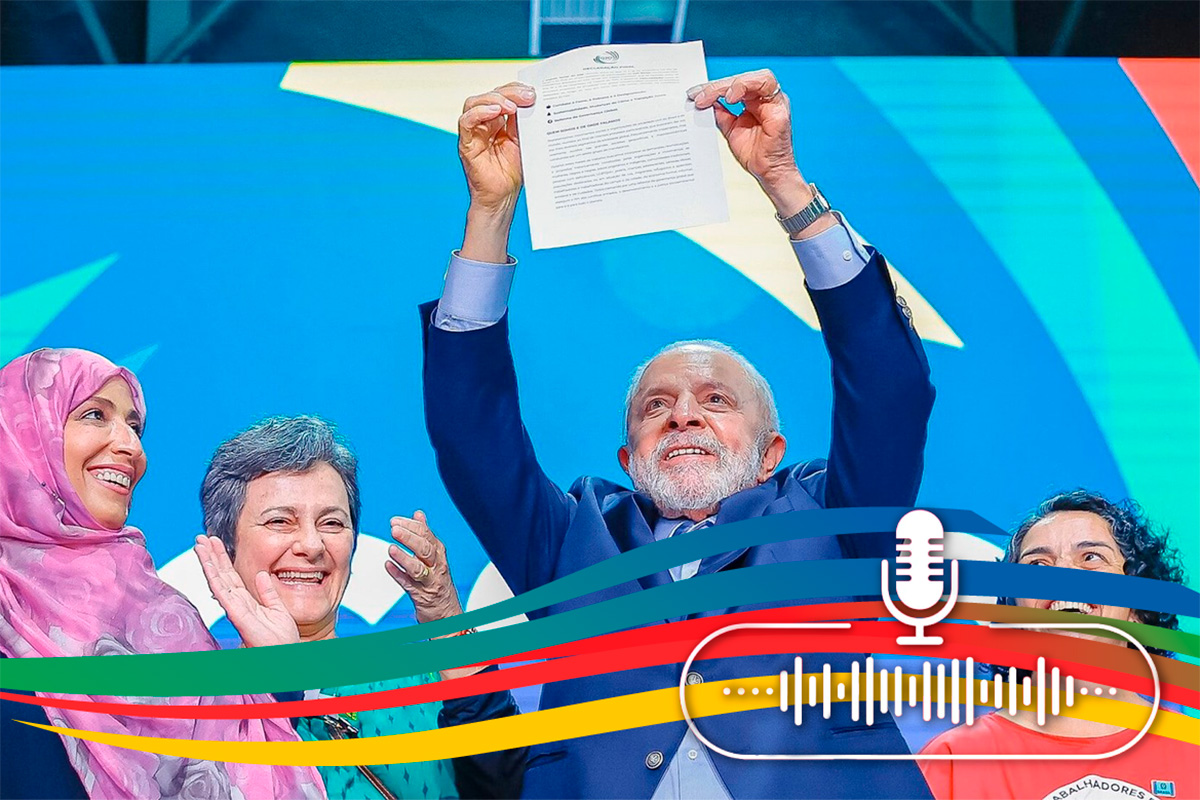G20 Social launches a global call for inclusion, democracy, and governance reforms
The Rio de Janeiro Declaration, emerging from the G20 Social, amplifies the demands of social movements for global justice, the fight against hunger and climate change, and the urgent reform of international governance. The event concludes this Saturday, ahead of the leaders' meeting next week.

By Leandro Molina/Site G20
The closing of the G20 Social was marked by emphatic speeches and the presentation of the Rio de Janeiro Declaration, a document prepared in collaboration with social movements from around the world. The event, held alongside the G20 activities, emphasized the urgency of reforming global governance to address contemporary challenges such as climate change, social inequalities, and geopolitical crises. Oliver Röpke, president of the European Economic and Social Committee, drew attention to the need to fight inequalities to shape a more just future. "We are at a crossroads. The global force faces a crisis where governance systems no longer serve our time. We need structural reforms to include civil society and strengthen the international community with inclusive growth and safeguarding social rights," he said. For him, the G20 Social should serve as a global example, showing that it is possible to create a world that listens to the aspirations of populations.
A Declaration for the future
Mazé Morais, a civil society representative, presented the Declaration, emphasizing that it resulted from a participatory process aimed at amplifying voices often overlooked in global decision-making. The G20 Social Declaration will be delivered to the G20 leaders at their summit on November 18 and 19. The document centers on three main pillars: combating hunger, poverty, and inequality; addressing climate change with a just transition; and reforming global governance.
The Declaration stresses that its development included contributions from historically marginalized groups, such as women, black people, indigenous peoples, people living with disabilities, workers in both formal and informal economies, traditional communities, and people experiencing homelessness. These segments, often affected by global decisions, demand more participation in global governance processes.
The movements call for urgent reforms to ensure that institutions like the UN and other multilateral bodies reflect today's global realities. The reformulation of the UN Security Council is seen as fundamental to increasing global representivity and promoting fairer and more effective solutions.
Combating hunger and socioeconomic justice
One of the central proposals is support for the Global Alliance Against Hunger and Poverty, aligned with the UN Sustainable Development Goals (SDGs). The defense is that the Alliance has a specific fund for public policies to combat hunger, guaranteeing universal access to adequate food, land, and water.
The Declaration also underscores the importance of democratizing food production and distribution, promoting agroecological practices, and resisting the commodification of natural resources. Decent work, aligned with the International Labour Organization (ILO) standards, is another key priority. This includes formalizing labor markets, strengthening the solidarity economy, and expanding union rights.
Sustainability and tackling climate change
Climate change was another highlight of the document. Social movements demand concrete commitments to reduce greenhouse gas emissions and protect essential ecosystems, such as tropical forests. The Declaration proposes the creation of an international fund to finance conservation actions and include local populations in sustainable productive activities.
The just transition was defined as a guiding principle to replace the fossil fuel-based production model with a low-carbon economy. The proposed transformation must create a level playing field for workers, while also addressing environmental racism and energy poverty.
Global governance reform and strengthening democracy
The document denounces that the current global governance model is unable to respond to contemporary challenges. Reforming multilateral institutions should promote a more inclusive multilateralism, enhance global south representation, and involve civil society in decision-making processes.
The Declaration warns about the threats democracy faces, particularly from disinformation and totalitarian rhetoric, often propagated by far-right groups. Defending the Rule of Law and fostering inclusive, transparent governance are identified as crucial for a legitimate and effective global agenda.
To fund these changes, social movements advocate for the progressive taxation of the super-rich, with funds allocated to transparent mechanisms overseen by civil society. The Rio de Janeiro Declaration also reinforces the need for global solidarity to mitigate inequalities and protect ecosystems.
Commitment to the future
The final document concludes with an appeal to the G20 leaders: "It is time for us to take on the responsibility of leading a profound and lasting transformation. This is the time to act with determination and solidarity to strengthen institutions, fight hunger and inequality, mitigate the impacts of climate change, and protect ecosystems," said civil society representative Mazé Morais.
Márcio Macêdo, Minister of the General Secretariat of the Presidency, praised Brazilian President Luiz Inácio Lula da Silva for including social movements at the center of the global debate. "Only a president with Lula's characteristics is capable of making social movements and the people central to the global agenda," he said.
The minister announced that the Declaration would be delivered to the G20 heads of state with "the fingerprints of the people."
The G20 Social in Rio de Janeiro hosted around 50.000 participants over three days, featuring 271 self-managed activities and discussions on 300 topics. The event, showcasing the originality and expansion of citizen voices, will continue in South Africa, the next G20 host country.
Watch the closing ceremony of the G20 Social
G20 Social - Final Declaration
The G20 Social Summit, held from November 14 to 16 in Rio de Janeiro, concluded a broad participatory process led by Brasil's G20 presidency. The event presented to world leaders—who will meet at the Leaders' Summit from November 18 to 19—a DECLARATION detailing global civil society's main proposals, which were agreed upon through year-long deliberations on the three central themes of Brasil's G20 presidency:
Combating Hunger, Poverty, and Inequality; Sustainability, Climate Change and Just Transition; Global Governance Reform;
Who we are and where we speak from
We represent social movements and civil society organizations from Brasil and around the world, gathered at the culmination of intense participatory processes designed to amplify the voices of diverse segments of global society—groups often affected but rarely heard in significant geopolitical and macroeconomic decisions made by a select group of representatives.
Over these months of work, we aimed to incorporate the needs, demands, and proposals historically advanced by organizations representing women, black men and women, indigenous peoples, traditional communities, people living with disabilities, LGBTQIA+ individuals, youth, children, adolescents, the elderly, displaced or homeless populations, migrants, refugees, stateless persons, and workers from rural and urban sectors, including the formal, informal, solidarity, and care economies. All these groups are united in calling for global governance reform that ends armed conflicts and ensures socio-environmental justice and development for themselves and the planet.
Combating hunger, poverty, and inequality
As a matter of urgency, it is imperative for all G20 countries and other nations to join the Global Alliance Against Hunger and Poverty initiative. In alignment with the UN 2030 Agenda's Sustainable Development Goals, this alliance must promote cooperation among countries and international organizations, creating a specific fund to finance public policies and programs that combat hunger and ensure universal access to adequate food.
We advocate for food sovereignty, grounded in the production of healthy food, as a cornerstone for eradicating hunger in every nation and globally. Peoples must have the right to democratized access to land and water, control over their own food production and distribution, and the use of agroecological practices that prioritize environmental preservation. The promotion of healthy eating should be central to achieving socio-environmental justice, ensuring equal access to environmental benefits for all social groups, regardless of race, class, gender, or origin, while respecting traditional food cultures and avoiding the commodification of natural resources.
We reaffirm the centrality of decent work, according to ILO standards, as an essential element in overcoming poverty and inequalities. Combating slave and child labor, human trafficking, and all forms of exploitation and precarious work is crucial. We emphasize the need to formalize the labor market and support inclusive, counter-hegemonic economies, such as the solidarity and popular economy, cooperatives, community kitchens, and the recognition and appreciation of the care economy. It is essential to guarantee access to decent jobs, social security, protection systems, and expanded union rights for everyone, especially young people, black communities, women, and the most vulnerable.
Sustainability, climate change, and just transition
The same dilemmas affecting millions who suffer from hunger, inequality, and poverty are mirrored in the lack of commitment from most developed countries and their elites to addressing climate change and global warming. Populations most affected by hunger and poverty also suffer the greatest impacts of climate emergencies and natural disasters, which are becoming more frequent and severe worldwide.
We stress the urgency of tackling climate change, respecting both scientific knowledge and the traditional wisdom of our peoples, and emphasizing the need for adaptation and mitigation commitments under the Nationally Determined Contribution (NDC) and the Paris Agreement. It is an ethical imperative for world leaders to commit firmly to reducing greenhouse gas emissions, preventing deforestation, and protecting oceans—essential steps to keep global warming below 1.5°C and prevent irreversible damage to our planet.
The just transition, as a process of socioeconomic transformation to a sustainable model, must be the guiding principle to replace the fossil fuel-based production model with a low-carbon economy. The transformation must tackl social exclusion, energy poverty, and environmental racism, and create a level playing field for workers, black people, and vulnerable communities. We affirm that this transition demands significant efforts in environmental education, social participation, and citizen empowerment.
We must also enhance the protection of our tropical forests by establishing the Tropical Forest Forever Fund (TFFF), an international financing mechanism aimed at preserving these forests and supporting the socio-productive inclusion of the communities who live in and protect them. This fund, alongside a New Collective Quantified Goal (NCQG) on climate finance, will bolster global efforts to conserve biodiversity and effectively address the climate crisis, ensuring continuous financial support.
Global governance reform
To achieve these goals, we call for an essential reform of the current global governance model, which has proven inadequate in addressing contemporary challenges and maintaining peace.
Thus, we emphasize the urgent need to reform international institutions to reflect contemporary geopolitical realities, promote multilateralism, and increase the representation of global south governments and peoples in decision-making forums. Specifically, reforming the UN Security Council is crucial to ensure a diversity of voices and foster balanced, effective solutions to present-day challenges.
We advocate for a reform that prioritizes democracy and the active participation of civil society. Democracy is under threat from far-right forces that spread disinformation and promote totalitarian and authoritarian rhetoric, undermining human rights and propagating lies, hatred, prejudice, xenophobia, ageism, racism, and violence in social and political relations within and across nations. Defending democracy requires upholding the Democratic Rule of Law and enabling direct public involvement in national and international mechanisms regulating information. Exercising the right to transparency and ensuring diverse communication strengthen inclusive global governance, lending legitimacy and effectiveness to states and international organizations.
We believe that tax justice is a fundamental tool to achieve sustainable development. Therefore, we advocate for the progressive taxation of the super-rich, ensuring that the funds raised are allocated to national and international funds to finance social, environmental, and cultural policies. All the funds claimed here must adhere to principles of transparency, oversight, and active civil society participation.
Conclusion
G20 leaders, the time is now for us to embrace the responsibility of leading a transformation that is truly profound and enduring.
Ambitious commitments are necessary to reinforce international institutions, combat hunger and inequality, mitigate climate change impacts, and protect our ecosystems. This is the time to act with determination and solidarity. With political will and institutional backing, facilitated by platforms like the Social G20 Summit, we can build a collective agenda committed to justice and global peace.
*Translated by PGET-UFSC
